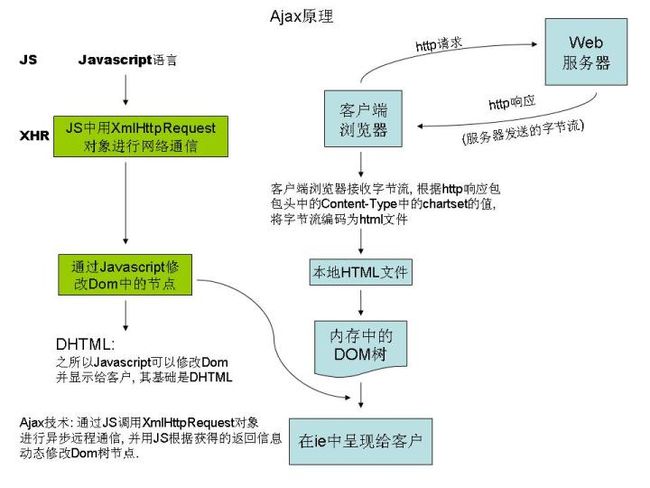Ajax学习笔记一
Ajax: Asynchronous JavaScript and Xml , 异步js脚本和xml , 常用来实现页面局部的异步刷新, 对提高用户体验有很大帮助. Xml在多语言时较有优势, 但Ajax技术实际上较多采用Json对象而不是Xml来处理数据.
为了能够在后台异步与服务器进行通讯, 微软在IE中添加了两个组件: 负责与服务器通讯的组件(XMLHTTPRequest)和XML的处理组件. 采用XML作为数据交换的载体, 在多语言处理时具有优势, 但xml的处理成本较高, 实际上Ajax中通常采用Json对象在客户端浏览器和服务器之间传递数据.
网页的生成过程其实是由服务器上的一组程序来完成的, 这样为了在客户端的JS语言和服务器端的C#语言传递数据, .Net提供了Json序列化和反序列化器, 来提供服务器端C#对象和Json对象之间的转换. 而在浏览器端可以使用eval()函数获取服务器传递过来的Json串转化为Json对象.
Ajax解决什么问题
我们都知道, 在客户端向服务器请求一个页面时, 服务器首先动态的计算并生成出页面, 然后再发给客户端. 客户端浏览器顺序编译并呈现页面.
在没有Ajax时: 假如说页面有个用户验证控件, 那么在客户端浏览器呈现用户验证控件时, 会等待服务器的验证结果, 收到结果后才能继续呈现页面元素. 而这个验证过程通常要进行读取数据库等操作, 这就是所谓的同步方式. 而这种方式, 会造成网页呈现的假死状态.
在使用Ajax后: 同样是验证控件, 客户端提交了验证请求后, 便继续顺序呈现其他元素. 当取得验证结果后, 由javascript在客户端修改内存中的DOM对象后并呈献给用户(注意: 这里修改的只是内存中的DOM对象, 而客户端接收的页面文件并没有修改). 这样, 使用异步的方式, 就不会出现假死状态, 同时客户端也节省了等待服务器返回结果时的时间开销.
Ajax的实现
1. Js中的Ajax异步调用: a.new b.onreadystatechange(处理responseText) c.open(get方式和post方式) d.send
同步调用: a.new b.open(get方式和post方式) c.send d.responseText
<span style="font-family: 'ms shell dlg'; font-size: 14px; line-height: 28px;">//ajax.html</span>
<!DOCTYPE html PUBLIC "-//W3C//DTD XHTML 1.0 Transitional//EN" "http://www.w3.org/TR/xhtml1/DTD/xhtml1-transitional.dtd">
<html xmlns="http://www.w3.org/1999/xhtml">
<head>
<title>Ajax of Javascript & jQuery</title>
</head>
<body>
<a href="javascript:getData();">Javascript-Ajax: Click me</a><br />
<br />
<br />
<input id="btn" type="button" value="jQuery-Ajax: Clike me"/>
<hr />
<div id="show">
</div>
<script type="text/javascript">
function getData() {
//创建XMLHttpRequest通信对象
var xhr;
if (window.ActiveXObject) { //标准情况下, 只能有两个ActiveXObject对象处理通信过程
xhr =new ActiveXObject("Microsoft.XMLHTTP");
}
elseif (window.XMLHttpRequest) {
xhr =new XMLHttpRequest();
}
else {
thrownew Error("Ajax is not supported by this browser");
}
var elem = document.getElementById("show"); //用来显示处理结果
//使用onreadystatechange事件处理结果
xhr.onreadystatechange =function() {
if (xhr.readyState ==4) { // readyState表示服务器响应状态. 4: 响应接收完毕
if (xhr.status ==200) { // status 表示 http 请求的状态
var json = xhr.responseText; //从请求中回应中获得json串
var obj = eval("("+ json +")"); // 借助 eval 将 json 串转化为对象, 在客户端浏览器必须解析为js对象
elem.innerHTML ="<span>"+ obj.name +"</span>";
}
}
}
//通过open设置请求方式
xhr.open("get", "json.ashx", true); //默认为ture, false表示同步方式
//发送请求
xhr.send(null);
/* 同步方式, false表示不适用异步方式
xhr.open("get", "json.ashx", false);
xhr.send(null);
//处理结果
alert(xhr.responseText);
*/
}
</script>
<script src="jquery-1.4.2.js" type="text/javascript"></script>
<script type="text/javascript">
$(function() { //ready函数, 脚本加载完即执行, 也可以用$(...$("#btn").click...)();加载
$("#btn").click(function showData() { //按钮上添加onclick事件, 事件处理方法为showData()
$("#show").load("jquery.ashx"); //从jquery.ashx中获取数据元素(innerHTML的内容), 并显示在div中
});
});
</script>
</body>
</html>
然后还需要在项目中, 添加类似于json.ashx一般处理程序, 用于提供相关数据(如: 表格日历的绘制, 去数据库验证等操作)
//json.ashx
<%@ WebHandler Language="C#" Class="Json"%>
using System;
using System.Web;
publicclass Json : IHttpHandler {
publicvoid ProcessRequest (HttpContext context) {
context.Response.ContentType ="text/plain";
//对于静态内容, 需要禁用浏览器的缓存, 否则老是旧结果
context.Response.Cache.SetCacheability(HttpCacheability.NoCache);
string name ="Mike";
string jsonFormat ="{{ \"name\": \"{0}\" }}"; //{{、}}是为了避免和Json中的{冲突而采用的特殊转义符
string json =string.Format(jsonFormat, name);
context.Response.Output.Write(json);
}
publicbool IsReusable {
get {
returnfalse;
}
}
}
//jquery.ashx
代码
<%@ WebHandler Language="C#" Class="jquery"%>
using System;
using System.Web;
publicclass jquery : IHttpHandler {
publicvoid ProcessRequest (HttpContext context) {
context.Response.ContentType ="text/plain";
context.Response.Cache.SetCacheability(HttpCacheability.NoCache);
DateTime now = DateTime.Now;
string jqueryFormat ="<span>{0}</span>";
string jquery =string.Format(jqueryFormat, now);
context.Response.Write(jquery);
}
publicbool IsReusable {
get {
returnfalse;
}
}
}
关于参数传递:
1.
get方式传参, 参数保存在URL中, 例如:
xhr.open("get", "json.ashx?name=xxx", true);
xhr.send(null);
在服务端(json.ashx后台代码), 可以用HttpContext类型的参数对象context来获取, 获取方式context.Request.QueryString["name"]....等等(自己在调试状态下看)
2.
post方式传参, 参数保存在请求包的包体(Body)中, 例如:
xhr.open("post","json.ashx",true);
xhr.send("xxx");
或者
xhr.send("name=xxx");
相应的服务器端(json.ashx后台代码), 针对2中"非键值对"、"键值对"有两种获取方法:
非键值对: 用context.Request.InputStream获取, 如:
System.IO.Stream stream = context.Request.InputStream;
System.IO.StreamReader sr = new System.IO.StreamReader(stream);
string strParam = sr.ReadToEnd();
其中涉及编码转换的, 自己在调整下.
键值对: 用context.Request.Form["name"]...获取
